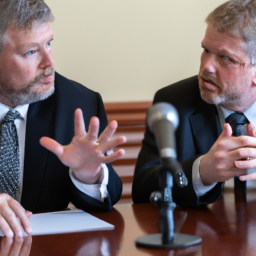During the 1980s, the world was in the midst of the Cold War, a period of heightened tensions between the United States and the Soviet Union. If there was one belief shared in 1985 by Western politicians, the leaders and peoples of Eastern Europe, and the Soviet political elite, it was that the relationship between the two superpowers was at an all-time low. However, there was one man who was determined to change that: Ronald Reagan.
Ronald Reagan, originally an American actor and politician, became the 40th President of the United States serving from 1981 to 1989. During his presidency, he met with the Soviet Premier multiple times, with the goal of improving relations between the two countries. These meetings were seen as controversial at the time, as many saw the Soviet Union as an enemy of the United States. However, Reagan believed that the only way to achieve peace was through diplomacy, and he was willing to take the risk.
The first meeting between Reagan and the Soviet Premier was in 1985, at a summit in Geneva, Switzerland. The two leaders discussed a range of issues, including arms control and human rights. Although they did not reach any major agreements, the meeting was seen as a positive step towards improving relations between the two countries.
The second meeting between Reagan and the Soviet Premier was in 1986, at a summit in Reykjavik, Iceland. This meeting was seen as a turning point in the relationship between the United States and the Soviet Union, as the two sides came close to reaching a major arms control agreement. However, the talks ultimately broke down, and no agreement was reached.
Despite the failure of the Reykjavik summit, Reagan continued to pursue diplomatic relations with the Soviet Union. In 1987, he and the Soviet Premier signed the Intermediate-Range Nuclear Forces Treaty, which eliminated an entire class of nuclear weapons. This was a major achievement for Reagan, and it helped to improve relations between the United States and the Soviet Union.
In addition to his meetings with the Soviet Premier, Reagan also worked to improve relations with other countries. At a G7 summit, Yasuhiro Nakasone took the lead and helped to heal a growing rift between France and the United States. Reagan also took part in a 1980 tour of the Middle East with a clandestine agenda, which was organized by a prominent Texas politician.
Reagan's efforts to improve relations with the Soviet Union were not without controversy. Many saw him as being too soft on the Soviet Union, and there were concerns that he was giving away too much in negotiations. However, Reagan believed that the only way to achieve peace was through diplomacy, and he was willing to take the risk.
In the end, Reagan's efforts paid off. By the end of the 1980s, the relationship between the United States and the Soviet Union had improved significantly. Mikhail Gorbachev, the Soviet Premier at the time, was seen as a reformer and a key figure in the thawing of relations between the two countries. However, it was Reagan who laid the groundwork for this change, and his meetings with the Soviet Premier played a key role in improving relations between the two superpowers.
In conclusion, Ronald Reagan's meetings with the Soviet Premier during the 1980s were a key moment in the history of the Cold War. Despite the controversy surrounding these meetings, Reagan believed that the only way to achieve peace was through diplomacy, and he was willing to take the risk. His efforts paid off, and by the end of the 1980s, the relationship between the United States and the Soviet Union had improved significantly. Reagan's legacy as a diplomat and a peacemaker lives on to this day.
